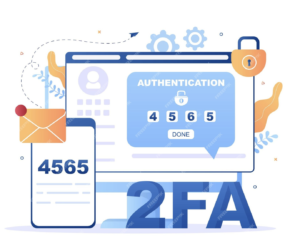With its promise of secure and decentralized money management, cryptocurrencies have taken the banking sector to new heights in today’s quickly changing digital world. Although the blockchain, the technology underlying cryptocurrencies, is extremely secure, hackers frequently target crypto wallets, which keep your private keys and let you communicate with the blockchain. Given the concerning increase in cyberattacks and cryptocurrency wallet intrusions, regular users and investors must take preventative measures to safeguard their investments, in this blog we will discuss preventive measures on how you can protect your crypto wallet from hackers
This Blog explores the most popular methods used by hackers to take advantage of crypto wallet vulnerabilities and helps you to provide the safety measures to keep yourself safe from cyber attacks.
Understanding How Crypto Wallets Work
It’s important to comprehend how cryptocurrency wallets work before we look at protection techniques. Your crypto current is not directly linked to your wallet it has two layers to store. Rather, it contains two cryptographic keys:

- Public Key: This is visible to others and works similarly to an account number. It’s used to receive cryptocurrency.
- Signatures or Private key: enables you to access your money and approve transactions. If hacked your total currency can be taken over by hackers
Cryptocurrency wallets can be either cold (offline) or hot (online). Everyone has pros and cons, in means of security.
Common Ways Hackers Attack Crypto Wallets
The sophistication of hackers’ attempts to compromise cryptocurrency wallets is increasing. The most typical attack vectors are as follows:
1. Attacks via Phishing
One of the earliest and most efficient ways to obtain sensitive data is through phishing. Fraudulent emails, messages, or pop-ups are sent by hackers to fool victims into disclosing their passwords, private keys, or seed phrases, sometime people click the links without knowing the actual source of the email it may look like a perfect copy of the source

2. Malware & Spyware
Malware is infected software meant to infiltrate a device and have access to sensitive data, along with private keys. Spyware functions in a similar manner, surreptitiously recording your keystrokes or duplicating files to obtain essential data, people who download apps from third parties are more prone to such attacks
3. Social Engineering
Hackers frequently pose as reliable people to trick people into divulging sensitive wallet information, such as a friend or technical support sometimes people receive calls from multiple sources that they are from this service centre and we will fix their issue.
4. Exploiting Software Vulnerabilities
Software flaws can affect cryptocurrency wallets, particularly those that are accessible online. Hackers may take advantage of security flaws or outdated platforms that you use to manage your assets, the reason companies want to update your applications over and over.

5. SIM Swapping
By persuading your telecom provider to move your phone number to their device, a hacker can obtain control of your number through this method. Once in charge, the hacker can access your wallet by evading two-factor authentication (2FA).

6. Man-in-the-Middle Attacks
This kind of attack happens when a hacker manages to snoop on your communications with your wallet provider and obtain private keys and other important data.
Let’s examine how to secure your cryptocurrency wallet now that we are aware of the risks.
Proven Strategies to Protect Your Crypto Wallet
1. Use Hardware Wallets (Cold Wallets)
Physical wallets that keep your private keys offline are called cold wallets or hardware wallets. Since they aren’t connected to the internet, they are safe from the majority of Internet hacking efforts. Trezor and the Ledger Nano S are popular choices.
Hardware wallets are thought to be among the safest ways to hold cryptocurrencies because they need physical access to approve transactions. To prevent modified devices, always get hardware wallets straight from the manufacturer.

2. Enable Two-Factor Authentication (2FA)
By requiring two forms of verification—something you have (usually a code issued by an app Like Google 2FA ) and something you know (your password), two-factor authentication adds an extra layer of security. 2FA makes sure that unauthorized access is more difficult, even in the event that your password is compromised.
Instead of using SMS-based 2FA, which is susceptible to SIM swapping attacks, use an app-based 2FA system like Authy or Google Authenticator.

3. Regularly Update Software
Keep your software up to date to bypass security flaws as the updates come with extra enhanced security because security flaws are frequently fixed by developers, and using out-of-date software puts you at unnecessary risk, whether you use a web-based wallet, mobile wallet, or desktop wallet
To provide an extra degree of security, make sure your operating system and any security software are up to date.
4. Be Cautious of Public Wi-Fi
Even Governments and cyber security advisors ask people not to use public wifi because of the lack of security public Wi-Fi is the foremost target of hackers and they choose crowded places like Times Square, New York, so use a reliable source of Wi-Fi Connection every time to access your cryptocurrency wallet to make any transactions or Use VPN to encrypt your internet for extra security.

5. Use Strong, Unique Passwords
Create a strong password with the combination of upper case letters, numners, special characters and the lowercase letters. For eg: InvesTOCrumb@#18 To create and safely save complicated passwords, use a reliable password manager rather than using the same password for all of your accounts.
Never save your passwords online to any cloud storage better to write them down and make them secure as if they would not be on the internet then they would be safe, also use your password by making sure that you are connected to a safe wifi network or the link you open is a trustworthy,.
6. Avoid Phishing Traps
Check the URLs of websites you visit twice at all times, especially if you are working with cryptocurrency. Phishing websites are made by taking care of everything so that they will look like same as the original website, checking the protocols of the website if they are secure or not, Keeping official websites bookmarked, and never clicking on dubious links in texts or emails.

Make sure you never give out your passwords, seed phrases, or secret keys to anybody. Providers of cryptocurrency wallets and reputable exchanges will never request this data.
7. Backup Your Wallet
It’s essential to back up your cryptocurrency wallet in case your device breaks down or is stolen. Most wallets offer seed phrases (a list of words) that allow you to recover your wallet if it’s lost. Keep this backup offsite in several safe places. Ideally, one duplicate ought to be stored in a fire-resistant safe, and the other in a reliable, secure location.
8. Monitor Transactions Regularly
Continue to monitor your transaction history to stay alert. If you see any unauthorised transaction take quick action change your password and transfer all your money to the safe network by getting in touch with the wallet provider.

9. Use Multi-Signature Wallets
To approve a transaction, a multi-signature wallet needs multiple private keys. This implies that without the extra keys, a hacker cannot access your funds even if one private key is compromised.
Because it increases security, this configuration is especially helpful for businesses or investors handling substantial cryptocurrency holdings.
10. Consider Custodial Solutions for Large Investments
If you own a sizable quantity of cryptocurrency, you should think about using a custodial service. Professional companies offer secure storage solutions for digital assets through these services, which are comparable to how banks keep traditional assets.
Seek out custodians who can provide cold storage facilities and insurance to guarantee the highest level of security for your assets.
Precautions to be taken if your crypto wallet is hacked
It’s critical to act quickly if you think your cryptocurrency wallet has been compromised. Change all related passwords, remove access to any connected devices, and move your money right away to a secure wallet. For more assistance, get in touch with your wallet provider. If required, you can also report the occurrence to the appropriate authorities.
Conclusion
Your primary concern in the rapidly growing realm of cryptocurrencies should be security. It takes diligence and awareness of best practices to protect your cryptocurrency wallet because hackers are always changing their strategies. Through the application of the tactics discussed in this article, you can considerably lower the likelihood that your assets will end up in the wrong hands.
Keep yourself current, knowledgeable, and most of all safe in the fascinating yet unpredictable world of virtual currencies.
